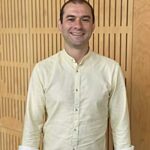Jump to
Osteoarthritis affects more than 20% of Australians aged over 60. The knee joint is commonly affected, causing persistent pain and difficulty in daily activities. Although exercise is the cornerstone of conservative treatment for knee osteoarthritis and recommended in all international guidelines, its effects are, at best, moderate.
BOOST is a ‘proof of concept’ study to explore the use of a novel intervention combining non-invasive brain stimulation and exercise therapy in people with knee osteoarthritis. This intervention applies repetitive transcranial magnetic stimulation, a safe and painless non-invasive brain stimulation, targeting specifically the brain region involved in pain processing and motor function to enhance the effects of exercise therapy.
The study might be a good fit for you if you:
- Are aged ≥ 50 years with knee osteoarthritis.
- Have knee pain for more than 3 months and on most days of the past month.
- Have average pain intensity higher than 4 out 10 in the past week.
- Do not have previous knee joint replacement or high tibial osteotomy.
- Do not knee surgery or joint injection in past 6 months.
- Do not have planned surgery in the next 9 months.
- Do not use oral corticosteroids currently or in the past 4 weeks.
- Do not have systemic arthritis, previous knee fracture or malignancy.
- Do not have other condition affecting lower limb function.
- Do not participate in knee strengthening exercise in past 6 months.
- Do not have a loss of sensation of the affected leg.
- Do not have neurological or psychiatric disorders.
- Do not have contraindications to brain stimulation such as epilepsy, metal implant in the skull.
- Do not use neuroactive drugs.
If you are eligible and agree to participate, you will be asked to attend 2 sessions per week for 6 weeks (each session includes 15 minutes of active or sham brain stimulation plus 30 minutes one-to-one exercise by a physiotherapist); 2 testing sessions (about 1.5 hours per session) before the start and after the completion of the intervention. All sessions will take place in a laboratory at NeuRA.
If you would like more information or are interested in being part of the study, please contact:
Name: Dr Wei-Ju Chang
Email: w.chang@neura.edu.au
Phone: 02 9399 1260
Like to see if you’re eligible? Click here
This research is being funded by the ANZMUSC Clinical Trial Network.



